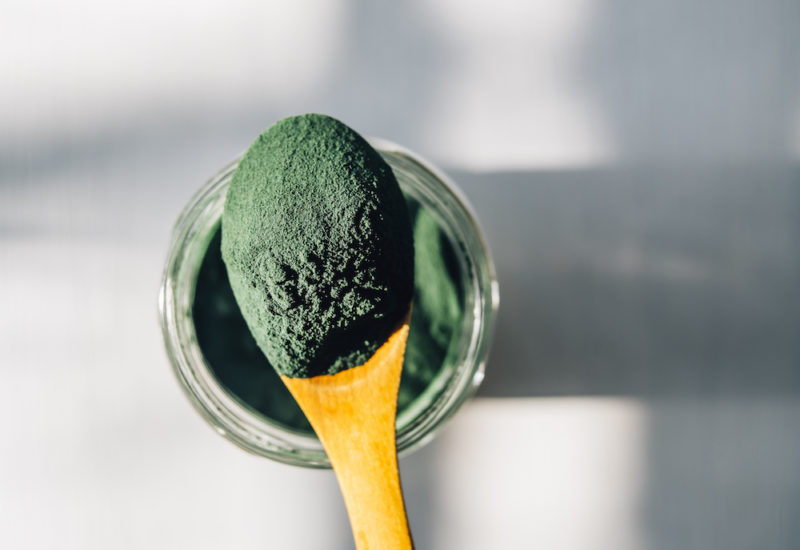It’s hard to believe we’ve already made it through half of 2018. From the release of our new Apple Cider Vinegars to our exciting giveaways on Facebook, we’ve had an exciting six months!
Even after 25+ years of serving happy customers, we’re still so delighted to meet new friends of Pure Planet.
If you have yet to experience us, let us share how we stand by our motto, “Pure and True, Since ’92.”
While many health-conscious folks are hip to the importance of the USDA Organic seal that stamps our products and other brand’s as well, does everyone know what it actually means?
If you’ve ever wondered what a company must do to get their product(s) certified, you’ve come to the right place.
Let’s chat “USDA Organic” and the other ways we ensure that our superfoods-fans get the finest of quality products.
Organic Certification
When you see the word “organic,” what do you think?
Most people think of “natural” when they see “organic.” That’s a correct assumption, but those two words cannot be tied together when it comes to certification laws.
Why not?
When it comes to putting the word “natural” on food-products, it is free and clear of any standards to do so. Bottom line:”natural” is not monitored under any close eye of authority.
“Organic” on the other hand is different.
You see, there are companies (like us!) who produce food that is free of synthetic additives, dyes, and harmful chemicals.
The United States Department of Agriculture (USDA) wanted to help separate these pure foods from falsely-advertised foods, making it easier for consumers to identify. So, they created the “Organic” certification.
To be certified, products should be 95% or more free of harmful additives without industrial solvents, irradiation or genetic engineering.
So, how does the USDA decide what’s organic and what’s not?
USDA Organic Certification
According to the USDA, certification requirements include:
- A system plan: The certification-seeker will outline just how they plan to comply with regulation, making special note of tillage, crop rotations, harvest, storage and other applicable requirements.
- Plan implementation and review: The plan will be reviewed for completed documentation. Follow-up questions may be asked based on deficiencies or anticipated problems.
- Facility Inspection: The seeker will have their facilities inspected and a comprehensive report detailing all findings will be submitted. Inspection scope will vary depending on operation. This can include soil conditions, equipment, production and even receiving and processing.
- Inspection Report Review: The inspector report and system plan will be joined together as a final packet of information on the company. Compliance will be studied based on requirements such as, observation of practices, assessments of contamination and potential hazards.
- Final Decision: If all steps are passed, the agency will issue a certificate listing the products that can be sold as organic. The facility will need to update its plan and practices, and there will be an annual inspection to keep the listing.
As you can see, this process is extensive, but well worth it.
Due to the large amount of work that needs to be done for every single product, entities like Oregon Tilth keep this process streamlined.
Oregon Tilth
What is Oregon Tilth?
For four decades, Tilth has been working to fulfill their mission: make food and agriculture “biologically sound and socially equitable.” They advocate for positive change, not just for safer consumption but also for the protection of Mother Nature.
And those are causes we can get behind!
Tilth is just one certifying body that helps ensure all requirements for the “Organic” seal are met. They are well-respected for offering certifications both nationally and internationally. From working with farmers to the Natural Resources Conservation Service, Tilth bridges together producers, companies and consumers.
We’re proud to work with them for our own certifications as we share a common goal: helping the world be more healthy through food and education.
Good Manufacturing Practice Certification
In a similar vein, we want to make sure our production is in tip-top shape. That’s why we worked hard on getting a Good Manufacturing Practice (GMP) certification.
Where would any company be without GMP certification?
This certificate is awarded to a facility that follows satisfactory compliance in meeting quality standards. It’s actually a little similar to “Organic” certification.
The US Food and Drug Administration (FDA) set forth GMP guidelines to ensure safety for consumers.
Some of these regulations include:
- handling of raw, quality materials
- establishing robust operating procedures
- protecting quality and investigating deviations
- maintaining clean safe lab facilities
Although GMP standards are just a baseline for any company, we strive to go above and beyond.
That’s why we developed full-scale Research and Development and Quality Assurance teams, who are always ensuring optimal production of every ingredient, like our carefully blended spirulina.
Staying Pure and True
As we head into the next half of 2018, we plan to continue to make top-quality products that can fit into any health regimen.
Keep a lookout for new products. We can’t wait for you to see what more we have in store!
Other sources:
https://blog.honest.com/learn-the-essentials-about-organic-labeling/
https://tilth.org/certification/start/certification-steps/
It seems that new health trends are constantly popping up — it’s way hard to keep track, right?
From intermittent fasting to milk from roaches (yes, that’s actually true), so many people are searching for their health fix that will make them achieve their ultimate goal.
One such trend that has been gaining quite a bit of traction is spirulina. Touted as an excellent source of nutrition, it has been referred to as a super-nutrient. But what exactly is it and does it really possess super-nutrition powers?
Let’s find out!
The Basics
Normally, the saying goes “unless you live under a rock, you should know…(insert: obvious info).” That’s actually the opposite when it comes to this superfood. Because, if you DID live under a rock, specifically one in the ocean, you might have actually come across this very, hidden plant. Spirulina is blue-green algae.
What? We know, that may be a little off-putting, but bear with us.
This form of bacteria is known as a cyanobacterium, which uses sunlight to produce energy. With amazing properties, it probably offers most people what they’re looking for in a supplement. And yes, of course, it’s safe to consume.
So, why would you want to take it? We’re glad you asked.
Exercise Support
First of all, spirulina is protein-packed. And that can do wonders when you are looking to either lose weight or toning up your muscles.
One study showed that high-protein can help burn more fat and speed up metabolism.
But that’s not all that this superfood can provide when you want to get fit.
Spirulina provides a good source of oxidative support, so is ideal for working out and cardio activity. A study explored its effects on people who exercised regularly, but weren’t total pros. They focused on a group of men who moderately exercised.
Here’s what they found:
The time it took for these men to be fatigued after a 2-hour run increased after taking spirulina. For you science-oriented folk, spirulina consumption led to a 10.3% decreased carbohydrate oxidation rate and increased fat oxidation rate by 10.95!
In English? The men were able to exercise for longer, with improved endurance and performance.
And that’s not all!
There is also, at the very least, a connection between spirulina and muscle maintenance. Another study investigated this connection by focusing on average people (not physically trained) who added the superfood to their diet for three weeks. After treatment, their blood was examined and they were monitored while using an incremental treadmill.
What did the researchers find? Spirulina consumption was linked to:
- boosted exhaustion time, even for average exercisers
- muscle damage protection, even during all-out exercise
Sounds pretty cool to us. But if you don’t exercise, can it still be beneficial for you?
Hmm…let’s find out!
Weight Loss, Blood Pressure & Cholesterol
Why, YES. The algae supplement also seems to have the ability to benefit both blood and body weight, even for those who don’t exercise.
In a randomized double-blind study on overweight individuals with hypertension, 40 patients took spirulina daily. Their BMI, weight and other functions were surveyed before and after.
Why did they find? Their BMI improved, along with weight and blood pressure. Score!
Seems like this green source of goodness is pretty nutritious, right? Speaking of greens…
In addition, thanks to the results of this spirulina study, we have learned that the super-nutrient encourages healthy cholesterol in those with type 2 diabetes, by helping lower LDL levels (bad) and promote HDL (good) levels.
Okay, if you’re still unimpressed because NONE of the above applies to you, there is more!
Allergies
That’s right, we’re talking to all those who fear every spring breeze or beautiful new bloom because they will soon bring on itchy eyes and fits of sneezing. This green source of goodness can be your non-pharmaceutical, organically-grown support when combatting high-pollen air times or your fluffy pet’s fur.
An allergic rhinitis (sinus allergies) study focused on 127 people and found that spirulina consumption could actually help reduce symptoms such as runny nose, congestion and even itching.
Do you STILL not think that spirulina is something you need daily?
Well, keep reading.
Green Clean, Metal-Cleansing Machine
Whether we know it or not, our bodies can sometimes absorb heavy metals. This can happen by unknowingly ingesting pesticides or inhaling or coming into contact with metal-poisonous sources.
But, the good news? Spirulina might be able to help with that. Greens have always been known for cleansing and alkalinity balancing and this green superfood is no different.
One study reports that spirulina, when paired with zinc, can help eliminate arsenic poisoning.
The report studied 41 patients with chronic arsenic poisoning, randomly prescribing them to either a placebo or spirulina-zinc extract for 16 weeks. The patients lived in areas where clean water is scarce, and metal-posioned water is unfortunately plentiful. These individuals were also given metal-cleansing filters to ensure they drank clean water.
But luckily, there’s a happy ending!
By the end of the study, their arsenic-poisoning was reduced, proving that blue-green algae could be of use for treatment.
Anti-inflammatory Antioxidant
Last, but certainly not least, this superfood is an antioxidant. This is due to a phytochemical called phycocyanin, which is responsible for its blue-green color and some of its oxidative stress-relieving effects. It can also help fight free radicals and inflammatory signals in the body.
Studies are promising but, of course, more research is necessary.
An Important Note
Because spirulina is algae, it is important to know the product origin, to ensure quality and cleanliness. You should only buy from brands that you trust.
That’s why we ensure our non-GMO, California-grown spirulina is up to par. With our promise of being Pure and True since ’92, you can count on only the purest spirulina, just like all of our other products!
- Spirulina (capsules): In capsule form, this can be added to any health or exercise regimen.
- Choco-Mint Spirulina (powder): For those looking for a little more flavor, our Choco-mint blend gives you all the nutrient support plus a boost of flavor. This is especially good for those with a more picky palette.


